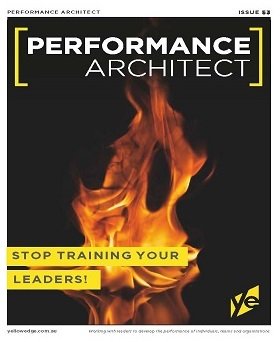53. Stop Training your Leaders!
by Andrew Simon
It comes as no surprise that many organisations and their managers continue to see and talk about leadership as a nothing more than a collection of skills and that developing leaders is often nothing more than building these skills through training programs.
Even if the popular rhetoric is about the need to coach, to mentor and develop leaders, the reality is often one where developing leaders, especially at the middle levels of the organisation, is carried out primarily through off the shelf training programs. Blame it on convenience, tight budgets, busyness or just lazy thinking, training continues to be seen and used an easy panacea for perceived gaps in leadership skill sets.
We shouldn’t be surprised here, as thinking about leadership so narrowly, as only as a collection of skills, leads naturally to think that perceived gaps in skills are best addressed through training interventions. It’s a kind of deficit based thinking. You either have a skill or don’t and if you don’t, you get trained to acquire the skill.
The trouble is that leadership is not just a set of skills or behaviours. If it were so, then we would have solved the problem of a poor leadership ages ago. There would be a set formula to follow or a fool proof algorithm to base a training program on by now.
To think that skills are all that leadership is about, is to reduce it to its very bare minimum. This reductionist thinking is underpinned by the false assumption that the context of leadership, that is the environment in which leadership is practiced and applied, is static and unchanging, requiring little judgement, adaptability, resourcefulness or practical wisdom.
Thinking of leadership only as a collection of skills denies the vital roles that personality and character play or that leadership is a relationship that is held between the leader and the led, or that leadership is also about balancing competing demands or that it’s about making decisions in the face of ambiguity and information overload.
Skill sets is a concept that is very much tied to a specific, well defined set of tasks. However, when the task and the context within which the task is to be performed are unclear, uncertain and volatile as is the case with leadership, then skill sets become less relevant than the other qualities of leadership like character, integrity, determination, resoluteness, courage and street smarts. Yet even in uncertain, ever changing times, many organisations continue to spend money, time and energy on generic, off the shelf, vanilla training programs for their leaders and then scratch their heads in wonder when these do not translate to effective leadership on the ground.
When this happens, we are in fact really training our leaders to be ineffective!
However, if we adopt a more abundant mindset, that is, where leadership is seen to be something we can all grow into, then developing leaders is a lot like a having a liberal education. With a growth mindset, learning to be a better leader is about learning about how the world works, and about how one thinks about things in context and in the context of others. To paraphrase the Greek philosopher Plutarch, developing leaders is not about filling an empty pail with PowerPoint driven content. It’s about lighting a fire instead. A fire that inspires people who aspire to be leaders to become better people first. It’s about lighting a fire of genuine care for the enterprise and for the people within it. It’s about lighting a fire for a clear vision and energising human effort to achieve it.
These are not mere skills. Rather, these are an amalgamation, a synergistic mix of character, attitude, care, relationships, energy, thinking and hard work.
Leadership development activity underpinned by a genuine growth philosophy would entail curated and facilitated time and space, where experiences can be shared, meaning can be made, purpose can be formed, effort can be validated, attitudes can be challenged, habits changed, relationships strengthened, ideas generated and energy restored.
Designing, curating and facilitating such development space is a challenging but enormously rewarding enterprise especially when you see leaders actually grow in front of your eyes; when they:
Take on a new perspective and see their reality, challenges and problems from a new angle
Discover something about themselves that will materially change the way they do things for themselves and with others
Build confidence to take risks and to become a force for positive change
Question their own long held assumptions about the way people or the world works
Are inspired to keep going and to staying the course through enormous difficulty
Reach out and mend broken work relationships or to begin new ones with people who are different to themselves
Stop falling into leadership traps
Set up to fill leadership voids in their organisations
Come up with their own ideas and innovations
If we are genuinely serious about developing leaders because we believe that leadership is actually vital to an engaged, high performing organisation, then we do need to invest effort into designing development experiences that matter and which help grow people into the leaders that we need and want.
This does not happen by chance, and certainly does not happen by sending people off to generic, off the shelf training programs.
Stop filling pails. It’s time we light fires!
Andrew Simon is Chief Executive of Yellow Edge, a company specialising in designing meaningful and effective leadership development experiences for leaders in the public sector.


